FDU’s Programs are Excelente
Hispanic Center Offers Specialized Learning and Support
By Rebecca Maxon
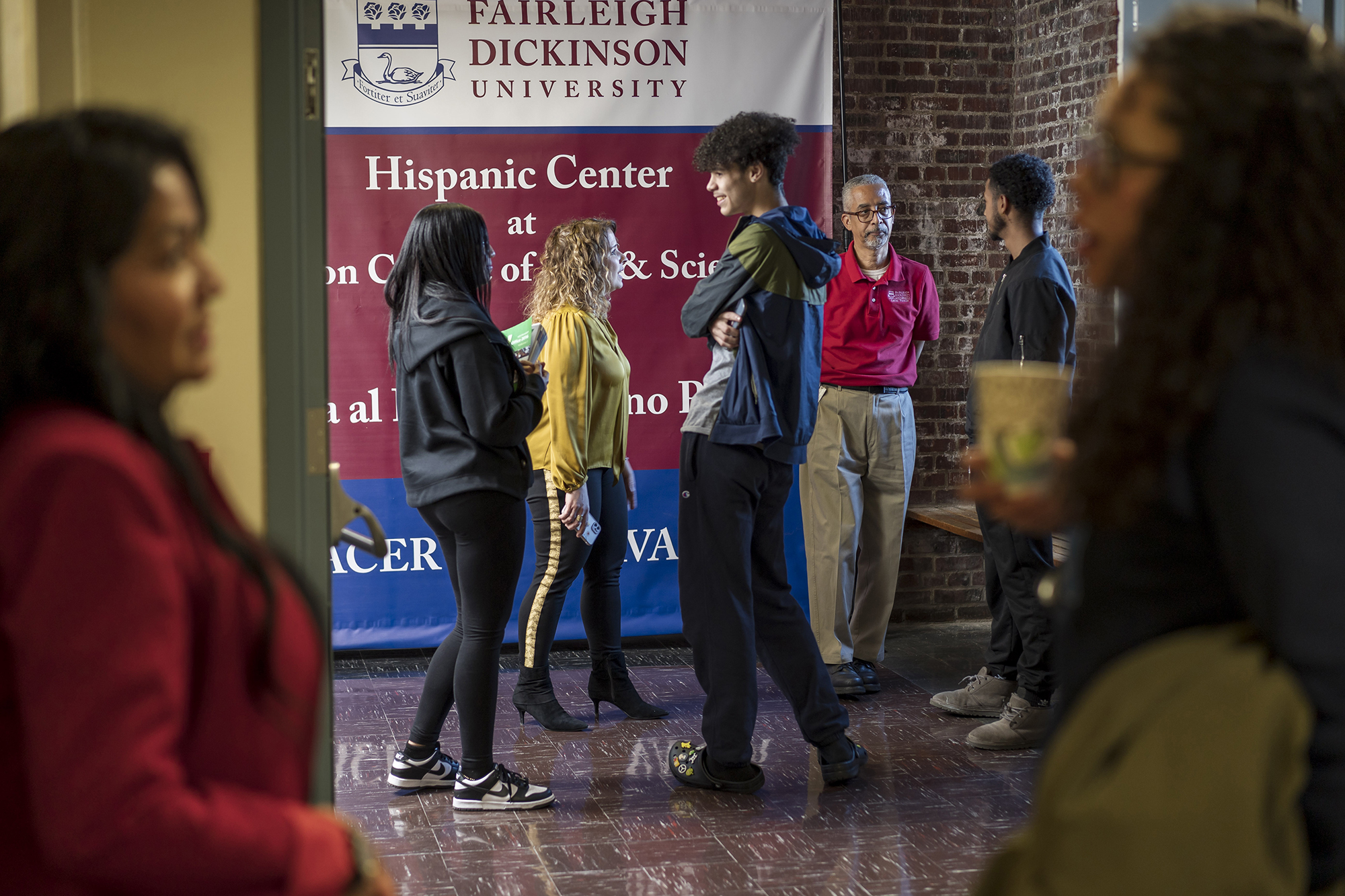
The center’s goal is “to serve all Hispanic students across the University so they can achieve their personal, academic and professional goals,” says Irene Oujo, executive director. (Photo: Karsten Moran)
For 20 years, since the launch of the Puerta al Futuro program, the University has dedicated itself to serving Hispanic students through innovative and engaging academic programming. In recognition of the success of Puerta and subsequent programs, FDU formally established the Hispanic Center, with a steadfast determination to support students as they complete their studies and reach their educational goals.
The center’s mission is “to serve all Hispanic students across the University so they can achieve their personal, academic and professional goals,” says Irene Oujo, executive director of the center and a member of FDU’s Diversity, Equity, Inclusion and Accessibility Council. “We strive to educate as many people as we possibly can, certainly those who are interested in improving their lives, expanding their perspectives, getting college degrees and moving forward.”
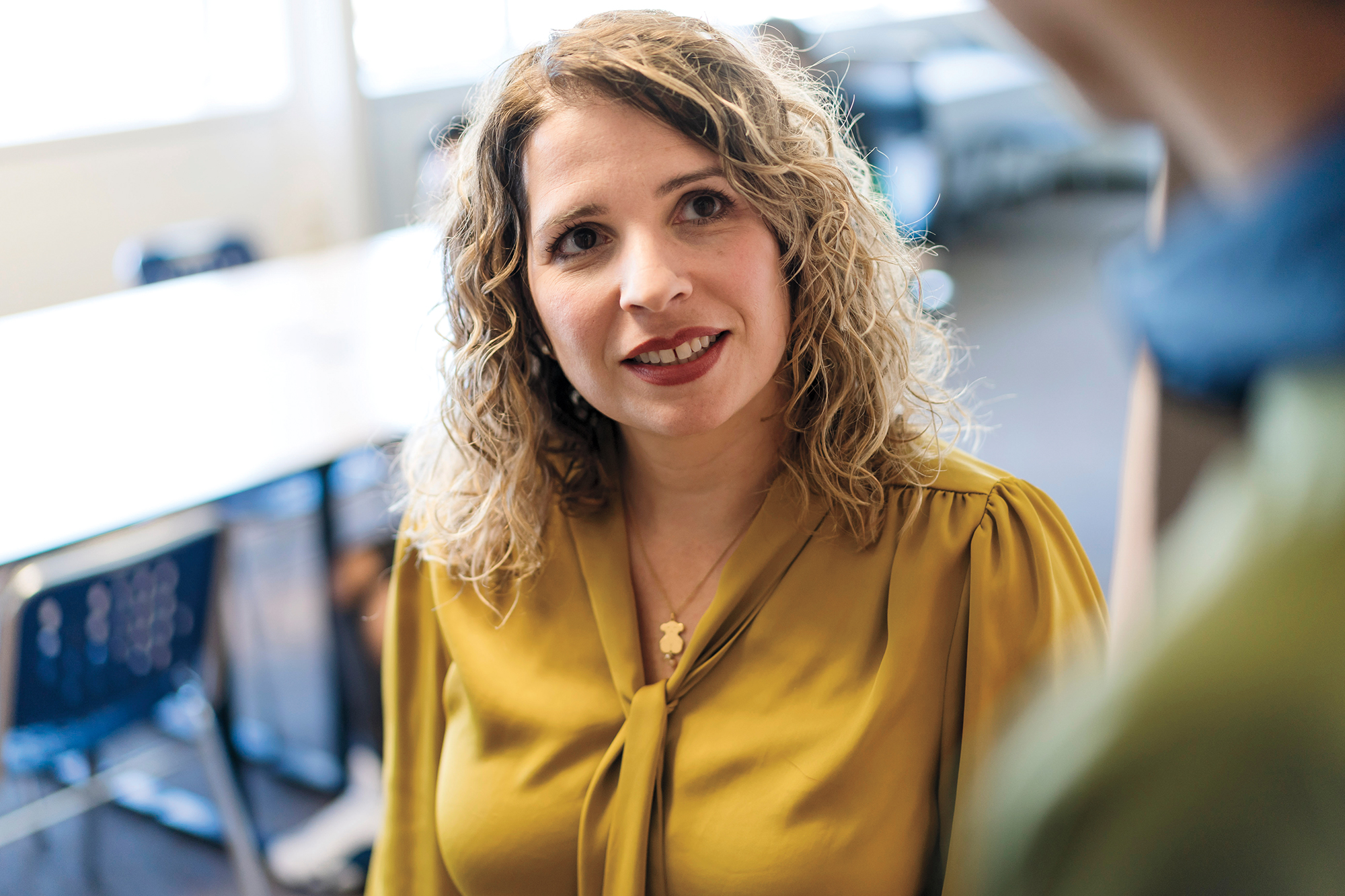
Irene Oujo is the executive director of the Hispanic Center. (Photo: Karsten Moran)
Excelencia in Education — a nonprofit devoted to accelerating Latino student success — honored FDU as a national collegiate example of excellence for the advancement of Latino students in the classroom and in the workplace. “The Hispanic Center continues to make important progress and is planning to expand its initiatives,” says Michael Avaltroni, interim president of Fairleigh Dickinson University.
FDU has also been recognized as a Fulbright Hispanic Serving Institution Leader and is a member of the Hispanic Association of Colleges and Universities.
“The University’s strategy is to meet learners where they are academically and culturally,” says Avaltroni. “Along with the University as a whole, the Hispanic Center focuses on providing educational opportunities that create a path for social mobility and on creating communities of belonging for our students.”
Four Programs Under One Roof
“Creating a center that celebrates cultural identity and provides support, mentoring and opportunities for Hispanic and Latinx students is critically important,” says Avaltroni. “Housing four programs together within a designated center makes it clear to our students and to the greater community that we are a destination for support.”
The programs include Latino Promise, for English speakers with Latino roots; and for emergent bilingual students, Puerta al Futuro, for adult learners; HACER (Hispanics Achieving College Education Recognition), for traditional college-aged students; and Avanza, for dually enrolled high-school students.
“We are proud of our accomplishments over the years in these programs and look forward to continuing to provide innovative programming and ever more inclusive opportunities for students,” says Avaltroni.
For the People, By the People
“Our people are the best asset of the Hispanic Center,” says Avaltroni. “We have a designated team of individuals who are laser focused on seeing students succeed.”
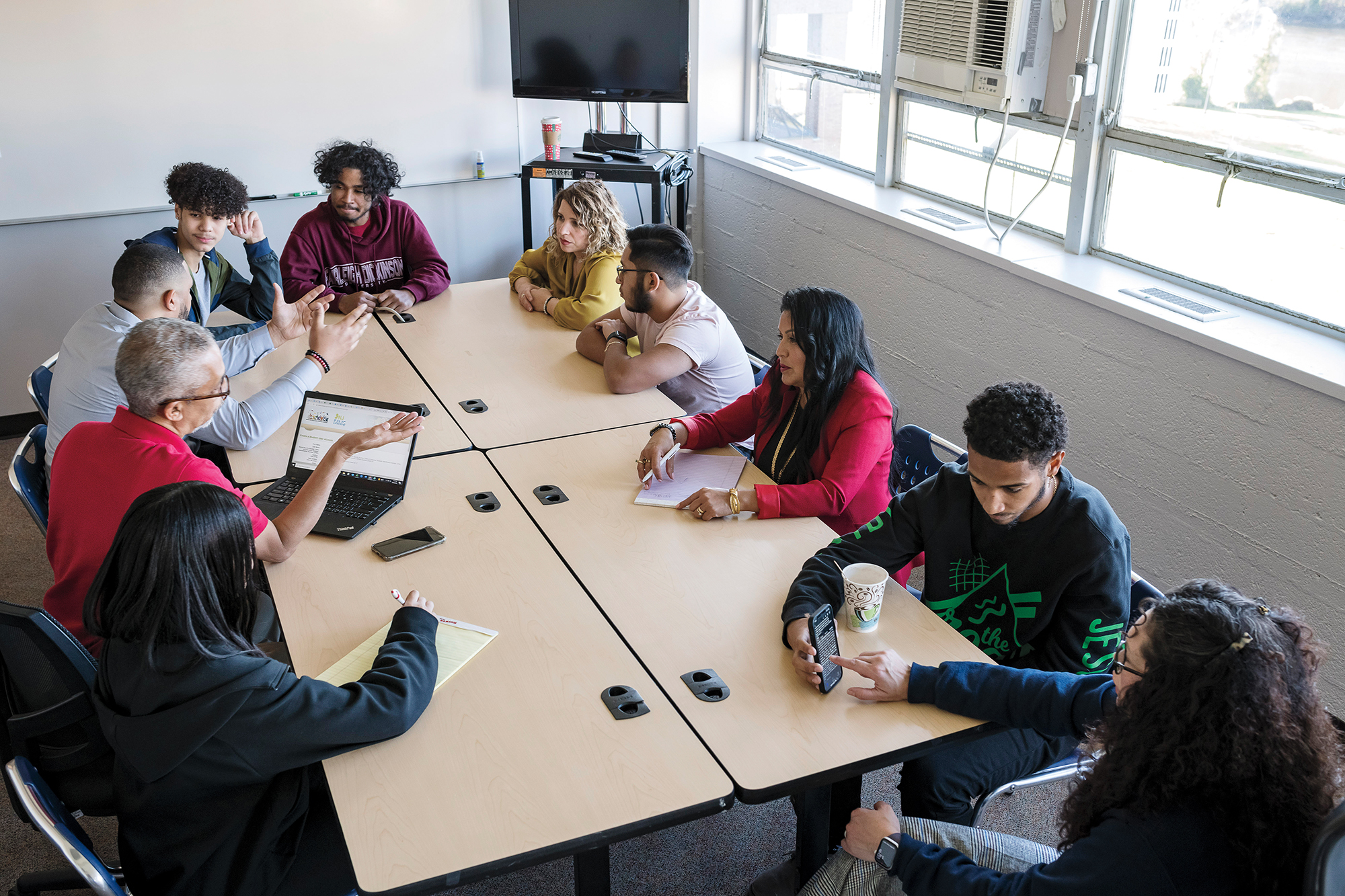
“Our people are the best asset of the Hispanic Center. We have a designated team of individuals who are laser focused on seeing students succeed,” says Interim University President Michael Avaltroni. (Photo: Karsten Moran)
Oujo, who joined FDU 17 years ago, has taught Latino students of all ages. She has provided diversity and inclusion training to high-school and university educators to improve the student experience, and she is chairperson of the Maxwell Becton College of Arts and Sciences’ Diversity and Inclusion Committee. She is committed to the work of advancing and promoting the Hispanic Center and says that a key strength lies in “the unique experiences our students, faculty, staff and administrators bring to the classroom.”
Oujo continues, “Our Latinx students are generally bilingual and bicultural, and through their classes and interactions with faculty, staff, mentors and peers, they build leadership, communication and soft skills.”
A first-generation American, her parents came to the U.S. in the early 1970s. “It was a drastic change in terms of the culture, the language and the geography, moving from a rural area to an urban one,” she says. Her parents prioritized their children’s education. But when it came time to apply to college, she, like so many first-generation students, didn’t know how the process worked. “We relied heavily on my high-school counselor,” she says.
That sense of uncertainty is something she wants students and their families to avoid, and instead to feel at home when they come to campus, both before and after application and acceptance. “Sometimes it takes a guiding hand to make a big difference in someone’s life. This is why I have worked so hard over the years to help my students and their families.”
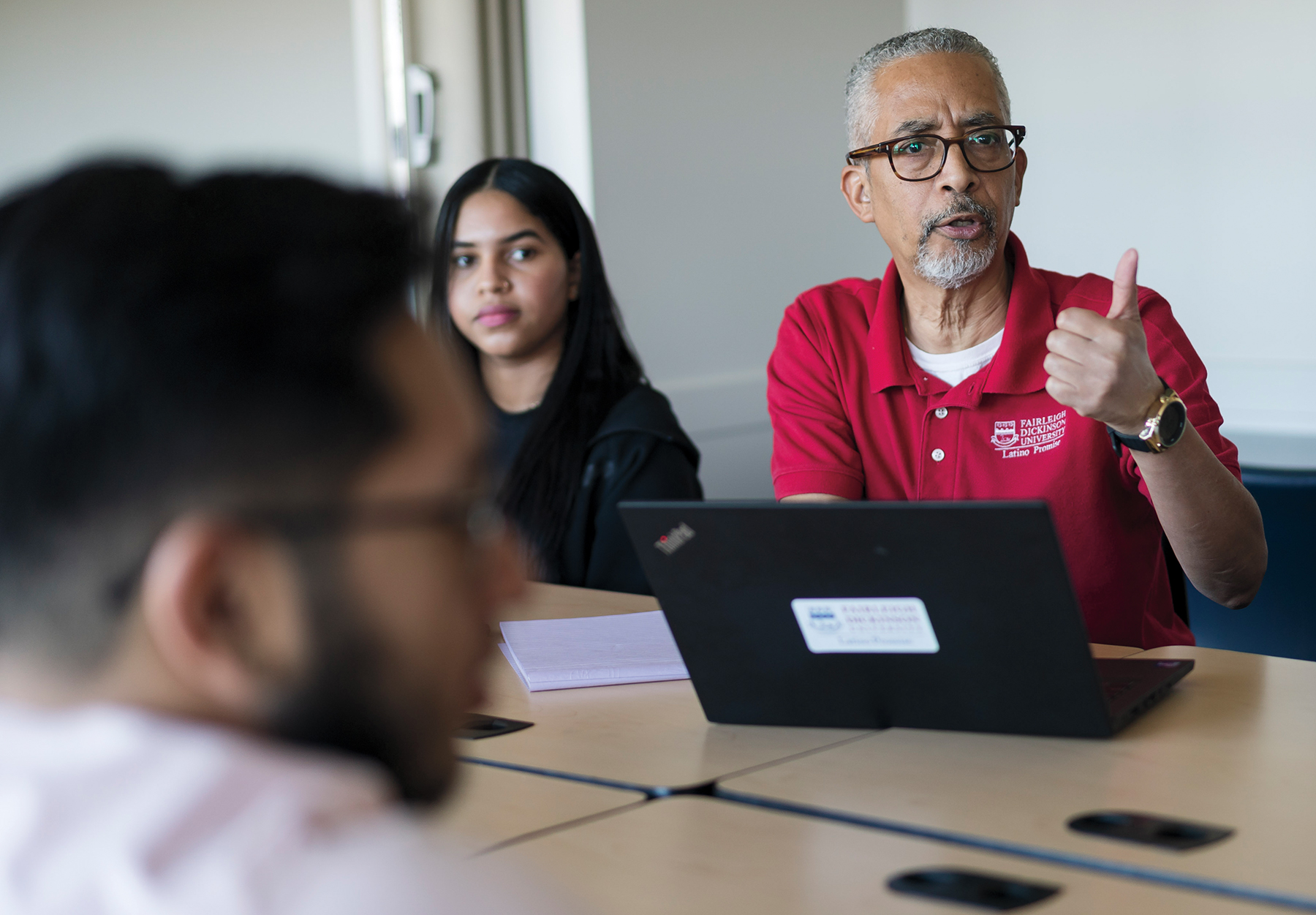
Israel Delgado, center, Latino Promise and HACER recruitment specialist, with freshman HACER student Scarlet Jimenez, left. (Photo: Karsten Moran)
Israel Delgado, Latino Promise and HACER recruitment and retention specialist, was the first in his family to graduate from college. Fortunately, his local community network steered him to St. Peter’s College (now university) in Jersey City, where he completed his bachelor’s degree.
He has since gone on to earn a master’s degree and is working on a doctorate in education. Years later, he still sees some of the same obstacles looming for prospective students. He does his best to guide prospective FDU students and to include their parents in the admissions process to ease their hesitation and to support their children.
A Personalized Approach
Latino Promise and HACER are sister associate in arts (AA) programs designed to amplify support and resources to pave the way for academic success.
Latino Promise is for students with English fluency, while HACER, meaning “to do” in English, is for English language learners and includes free English as a Second Language (ESL) classes taken at the same time as bilingual college-credit courses. Both programs encourage their graduates to continue on to bachelor’s degree programs at the University.
“I chose Latino Promise because it is great at helping Latino students get further in life,” says Pilar Arias, a freshman commuter student in FDU’s first Latino Promise cohort on the Florham Campus.
FDU’s personalized approach in these programs comes even before the students are admitted. “I start the process by building relationships,” says Delgado. “I am always trying to build a community — relationships with the schools and the school counselors.”
Some of Oujo and Delgado’s students are learning English and most are dealing with financial aid documents, including FAFSA (Free Application for Federal Student Aid), Master Promissory Note and HESAA (New Jersey Higher Education Student Assistance Authority); degree audits; course loads; credits; and more.
“Without that personal guide, students can stumble, and those stumbles can be costly and frustrating to students and their families,” Oujo says.
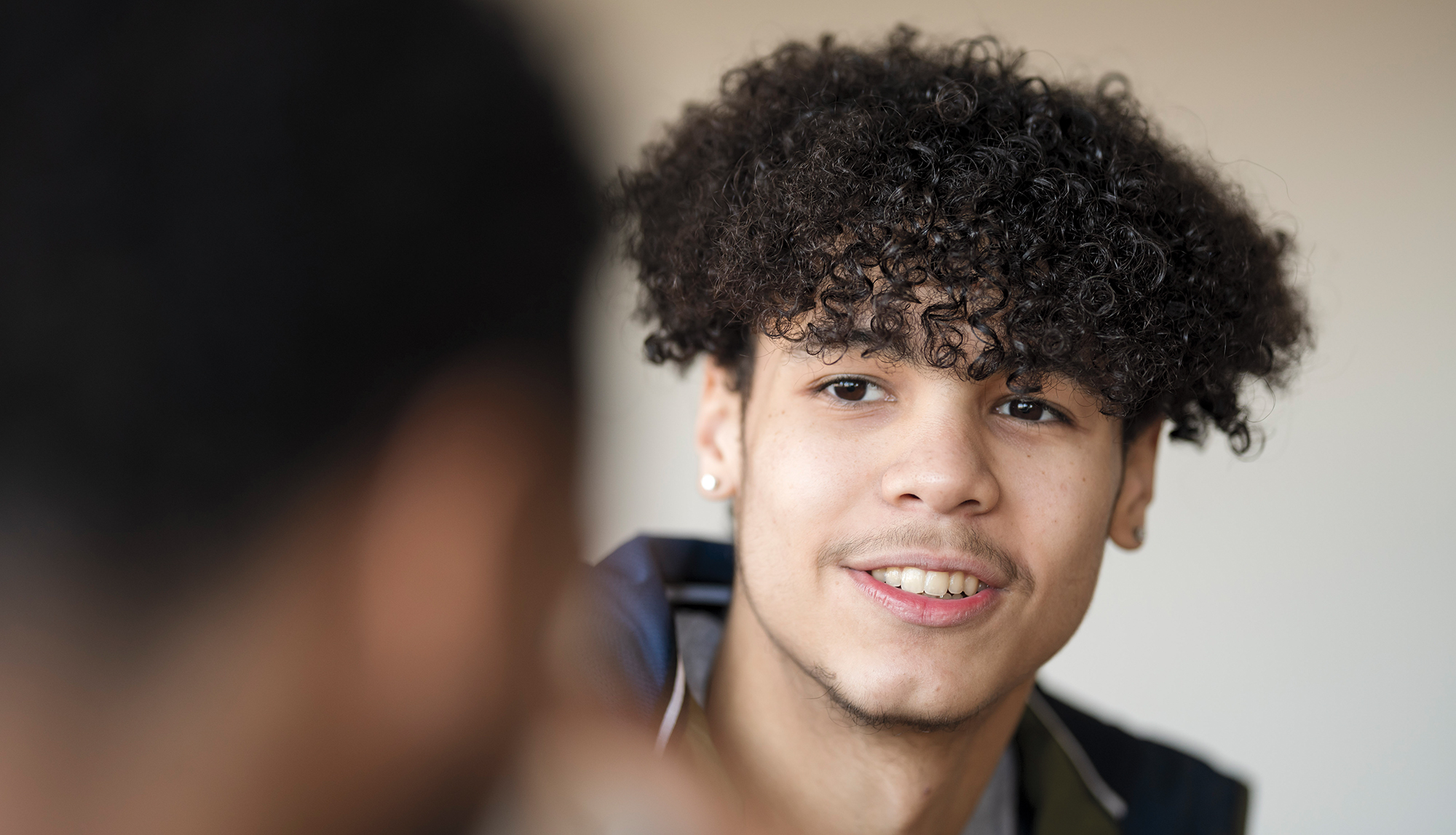
Angel Gomez, freshman Latino Promise student. (Photo: Karsten Moran)
“I believed I didn’t have the money or grades to go to a private school,” says Angel Gomez, a Latino Promise freshman at the Metropolitan Campus majoring in business with a digital marketing concentration. Then his high-school counselor told him about Latino Promise. “He reached out to Israel Delgado.”
The first day meeting Delgado, says Gomez, “he told me he was blown away by the email my counselor sent him about me.” Delgado went over the program’s benefits and financial aid.
“What really did it for me,” he says, “were all the opportunities I was given. Even before classes started. Israel told me I would be a great student ambassador, and here I am now.”
Latino Promise students may pursue a two-year, 60-credit Associate of Arts or Associate of Science degree, and also have the opportunity to complete a bachelor’s degree.
“By having someone they can turn to, who speaks their language — and the language of college life — who can guide them through the process, students are more likely to enroll, persist and graduate at higher rates,” Oujo says.
Arias says Delgado remains “someone I can always rely on if I have any sort of issue.”
HACER students enjoy a small program tailored to their individual needs while benefitting from the resources of a large university. Dedicated bilingual faculty and staff provide academic support and mentoring, ensuring student success.
A Family Affair
Another unique element of the Latino Promise and HACER programs is a focus on the students’ families.
“I always tell prospective students that when they come to campus they should bring their parents,” Delgado says. “I want them to be part of the process.” Siblings may also attend campus visits and learn about the college search and application process.
Delgado conducts FAFSA presentations for parents in area high schools, which are applicable to any college. He also often walks students over to the financial-aid office to assist them with their FAFSA and HESAA forms.
Catherine Acosta, a Colombian American senior lecturer of psychology, leads a College Knowledge workshop for parents and guardians, which offers an overview of the admissions process and information on college tuition and costs. “My background allows me to connect with our students and families more and to create a safe space for them,” she says. “We try to mirror their cultures.”
Focus on Adult Students
The Puerta al Futuro program, founded in 2003, is designed for adult learners who would benefit from ESL classes while earning college credit. Initially, classes are taught fully in Spanish, transitioning to all-English classes over the course of the degree. This way, the cost of ESL classes is eliminated, and students start on their AA or bachelor’s degree requirements right away.
Fernando Alonso, former director of the Puerta al Futuro and Latino Promise programs, now a senior lecturer, says the Puerta program caters to smart people who have degrees in their home countries but are not credentialed in the United States. It is also for people “struggling with the language, the economic issues and the cultural issues surrounding coming from another country,” he says.
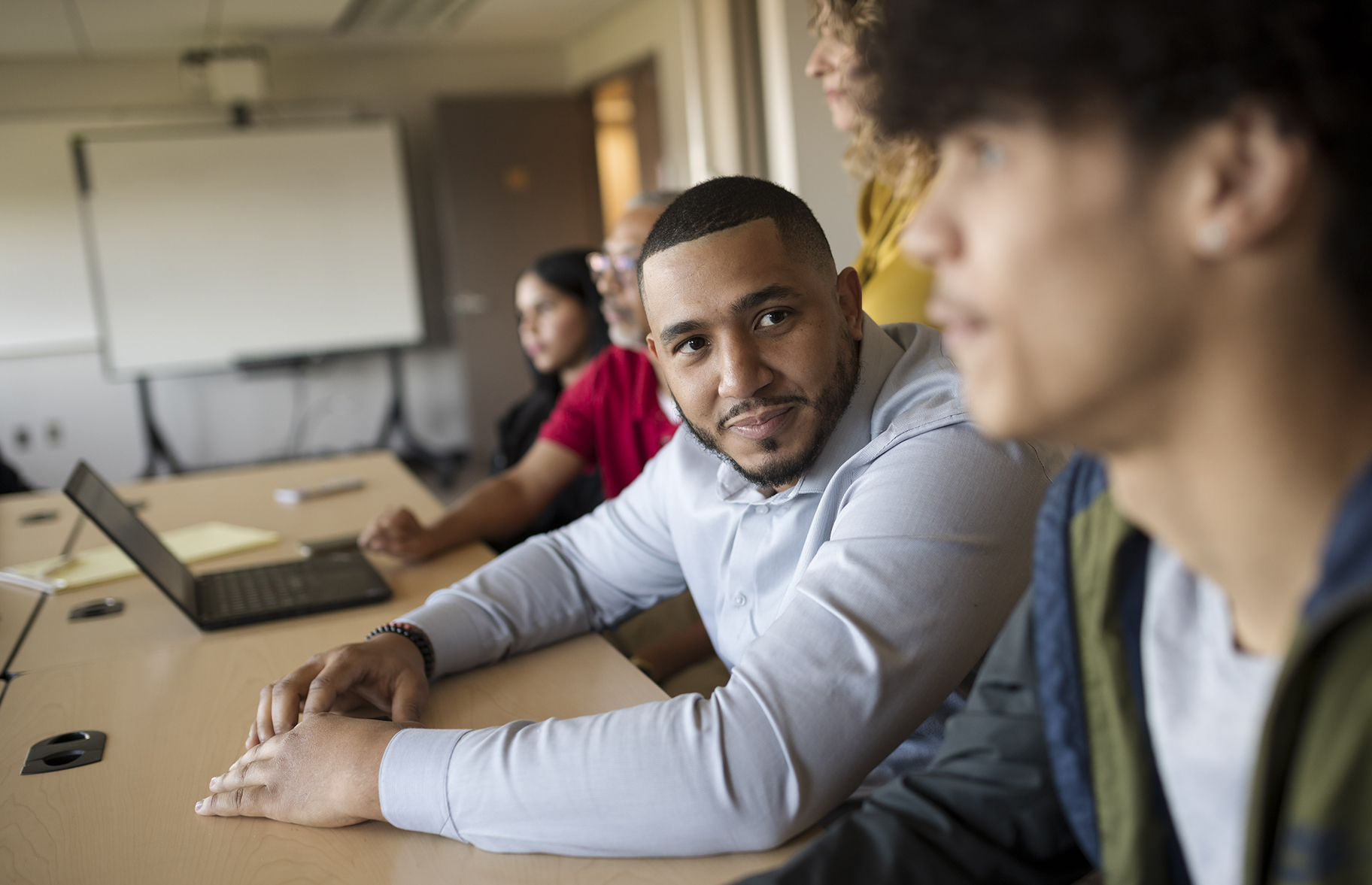
Pedro Hernandez, a student in the Puerta al Futuro program. (Photo: Karsten Moran)
Pedro Hernandez, a part-time student in the Puerta al Futuro program who emigrated with his family from the Dominican Republic, says, “Puerta is a good choice. I feel confident — not because we share the language and the culture, but because we shared the changes we all have to deal with when we come to this country.” He is currently a vendor for a food and beverage company and a driver for a ride-share company.
The program is also ideal for those who have earned some college credits, and wish to complete their bachelor’s degree and/or a Master of Administrative Science degree. Hernandez entered the program with 57 credits transferred.
In addition to transferred college credits, students can sometimes earn credit for life experiences. “Adult students have a way of connecting the topics covered to their own lives,” says Acosta. “We also talk about diversity and what that means in the workplace. A lot of my classes have diversity, inclusion and social-justice components to them. I bring my experience as a Colombian American to every class I teach. It allows me to connect to students because they can see themselves in me.”
Pre-college Component
Avanza, meaning “to advance forward,” is a pre-university program allowing Passaic high-school students to experience bilingual classes in history, mathematics and science on FDU’s Metropolitan Campus while receiving credit toward their high-school graduation requirements as well as college credits.
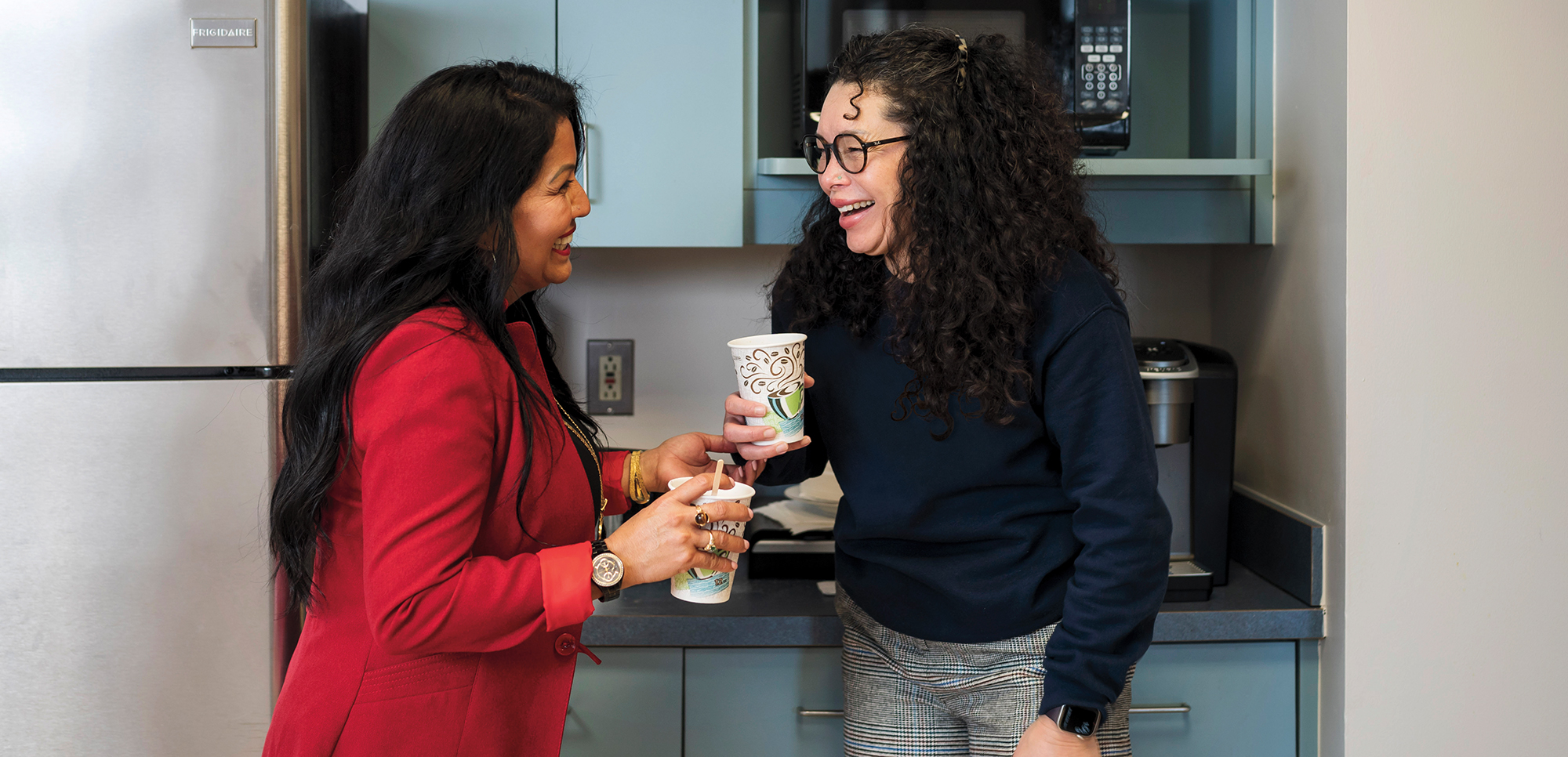
Luz Flores, left, coordinator, Avanza and Puerta al Futuro, chats with Catherine Acosta, right, senior lecturer of psychology. (Photo: Karsten Moran)
“The Avanza team understands the needs of Latino students and of the Latino community, as many of the team members are immigrants themselves who worked for their own American dreams,” says Luz Flores, coordinator for the Avanza and Puerta al Futuro programs. “This makes them excellent professors.”
Avanza was founded in 2018, when New Jersey Gov. Phil Murphy announced state support for dual enrollment in high-school and AA programs. The cost of tuition, transportation and food is paid for by the Passaic School District.
“The benefits of enrolling,” says Flores, “are learning English while taking classes to graduate from high school starting in 10th, 11th and 12th grades; earning college credits; becoming familiar with the higher-education experience; and being able to pursue their college careers at FDU with continued support.”
“The benefits of enrolling,” says Flores, “are learning English while taking classes to graduate from high school starting in 10th, 11th and 12th grades; earning college credits; becoming familiar with the higher-education experience; and being able to pursue their college careers at FDU with continued support.”
A Community Within a Community
“It is important for students to feel at home on campus,” says Oujo. “We work with career development, and we even hold a Latino Leadership class.”
Many student organizations at FDU are dedicated to building and supporting a vibrant multicultural community, inclusive of all students, while others are specifically geared to Latino students.
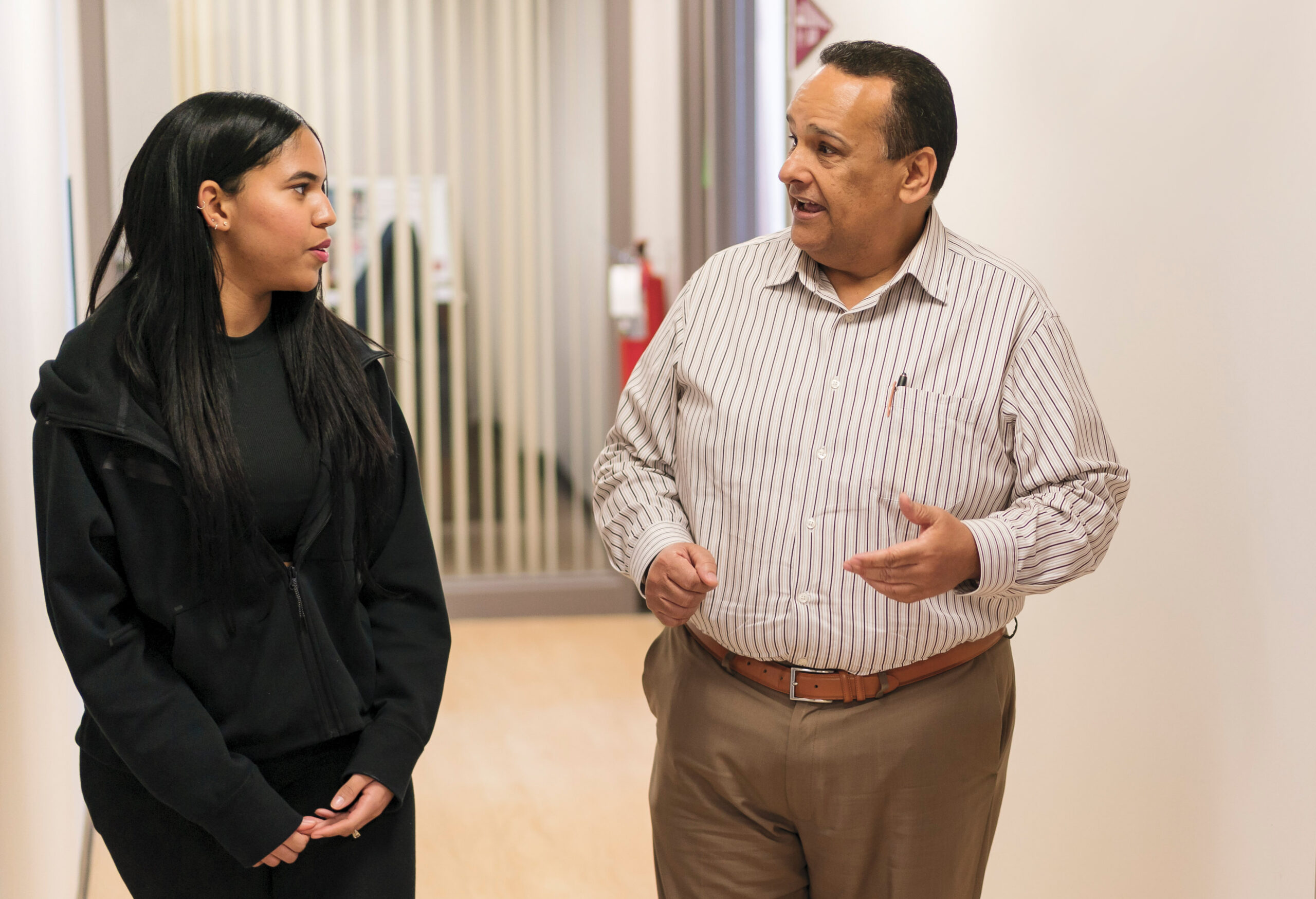
Scarlet Jimenez, left, a freshman HACER student, speaks with Roberto Diaz, the associate director of Puerta al Futuro. (Photo: Karsten Moran)
At the Metropolitan Campus, students can join the Multicultural Council; the Organization of Latin Americans; the Lambda Sigma Upsilon Latin Fraternity; the Lambda Theta Phi Latin Fraternity, Inc.; The Lambda Pi Upsilon Latinas Poderosas Unidas Sorority, Inc.; and the Lambda Theta Alpha Latin Sorority, Inc.
At the Florham Campus, there is the Lambda Theta Phi Latin Fraternity, the Diverse Student Union and The Latino American Student Organization.
“I like our community here,” says Arias. “We are a small group of the first Latino Promise students on the Florham Campus.”
Students are involved in Relay for Life to raise funds for the American Cancer Society; Latin Heritage Month; food drives; clothing drives; student government and more.
“I have never felt more comfortable with a group of students,” Gomez says. “I feel like everyone here on campus, from students to professors, is very welcoming and easy to connect with.”
Students find connection and community with their professors, too. “Professor Hilary Almeida taught me that no matter what our differences are, or how different our beliefs are, there is always space for understanding and admiration,” Hernandez says. “I believe FDU is a big family. People have been very receptive.”
Outside of the Latino Promise program, Arias says, “everyone is welcoming. “They’re all open to great friendships. You get to meet a lot of people from different cultures, religions, everything! We all have different backgrounds or different cultures, and it’s just coming together and getting to know each other.”
Graduates have gone on to pursue advanced degrees and to careers in business, education, law, medicine, science and communications. Alonso says, “We want our students, ultimately, to become leaders in the community. We have alumni who have gone on to pursue a PhD, to work in Spanish television and to hold high-level corporate positions.”
The Hispanic Center programs emphasize a humanitarian mindset, to motivate students to give back to their communities at home, on campus and in the greater world.
“Our measure of success,” says Oujo, “is not only our associate degree completion rate, which is very close to the expected two years, but is also seeing our Hispanic alumni happy on graduation day as well as when they return to campus with their families.”